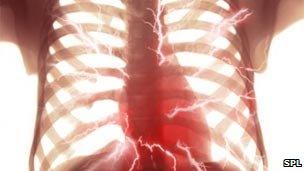Are sport stars at more risk?
- Published

About 500 young people die each year from cardiac arrest
Most people associate heart problems - and cardiac arrest in particular - with older people.
But there are about 500 deaths a year in the UK from cardiac arrest among the under-30s.
When it happens it is shocking. Doubly so when it affects a sports star like 23-year-old Fabrice Muamba.
He is said to be one of the fittest players at his club, Bolton Wanderers.
The same sentiments were expressed about Marc-Vivien Foe, the Cameroon footballer who collapsed and died during an international match in 2003.
But the underlying cause of such deaths are likely to be inherited rather than a reflection on their fitness.
Genetic abnormalities are usually associated with arrhythmias - irregular heart beats - or cardiomyopathies, which is a disease of the heart muscle.
But where sport can play a role is on the likelihood of these conditions leading to a cardiac arrest.
The evidence is not clear-cut.
But research has suggested that those with inherited conditions are twice as likely to suffer a cardiac arrest if they play sport at a high level.
Dr Leonard Shapiro, a consultant cardiologist and medical adviser to the Football Association, says it is always difficult to know exactly what triggers the attack.
But he says: "There is a predisposition in some individuals to have a cardiac event under very high physical and emotional stress."
The question that is always asked after such events is whether anything can be done to prevent them.
Many sports in Britain regularly screen top athletes, although it is not mandatory as it is in some countries such as Italy.
Abnormalities
In football, players are checked at 16 and then are likely to have regular check-ups as their career goes on.
Those that are diagnosed with a problem often have to give up top-level sport.
Sports cardiologist Sanjay Sharma, who also works for the charity Cardiac Risk in the Young, says the tests are thorough, but not perfect.
"It involves taking a history relating to cardiac symptoms, which include chest pain during exertion or breath which is disproportionate to the amount of exercise being performed, and blackouts, and asking about a family history because many of these conditions that can cause cardiac arrest are hereditary.
"We then perform a cardiac examination and following that we do an ECG (electrocardiogram), which is an electrical tracing of the heart which looks for electric faults of the heart, and a cardiac ultrasound, which looks at heart muscle problems or problems with the heart valves."
However, they do not guarantee that an abnormality will be picked up.
The difficulty is that such abnormalities are not always permanent.
They can come and go - as the Muamba case suggests. It has been reported that the Bolton player had four such screenings during his career, the latest of which was done last summer.
- Published11 February 2011